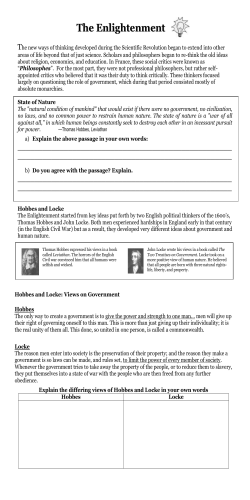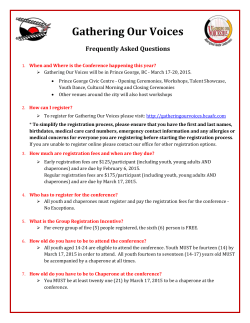
Political Philosophy Divine Rights Philosophy Natural Rights Philosophy
Political Philosophy Freedom - the right to do anything of which one is capable Liberty - the right to do anything of which one is capable within the limits of law Justice - fairness, fair treatment (not equal treatment !) Divine Rights Philosophy Natural Rights Philosophy God chose certain people to rule (royal blood) God made all people equal, people created gov’t to protect their rights, if gov’t doesn’t protect the people’s rights, the people may abolish the gov’t and create a new gov’t to protect rights Divine Rights Philosophy (Niccolo Machiavelli) Natural Rights Philosophy Aristotle Thomas Hobbes John Locke Jean-Jacques Rousseau Thomas Jefferson Thomas Paine Baron de Montesquieu Ben Franklin James Madison Authors and their Writings Aristotle Politics Niccolo Machiavelli The Prince Thomas Hobbes Leviathan John Locke Two Treatises on Government Jean-Jacques Rousseau On The Social Contract Authors and their Writings Thomas Paine Common Sense Rights of Man Thomas Jefferson Declaration of Independence Baron de Montesquieu The Spirit of The Law Benjamin Franklin The Albany Plan of Union James Madison U.S. Constitution Niccolo Machiavelli (1469-1527) Niccolo Machiavelli - The Prince Written c. 1505 published 1515 Translated by W. K. Marriott 1908 Niccolo Machiavelli – The Prince Machiavelli defends an archaic belief that a King (Prince) has the right to do anything he wishes. (He’s writing to a King trying to get a position in the new gov’t) Most political philosophers disagreed with these ideas for hundreds of years, but Niccolo is trying to tell the king what he thinks the king wants to hear. (For the job) Machiavellian thought says “might makes right”, that if a leader has the capability to conquer another land and the desire to own its resources the leader should sacrifice the lives of his soldiers and use them to fight war. Machiavelli compares a Prince to a shepherd Machiavelli compares the citizens to a herd of sheep Shepherds do not keep sheep because of a love of animals; they use them for their own well-being (Profit/Power) A shepherd takes good care of his sheep so he maximizes profit, but a sick sheep will be destroyed before he infects the rest of the herd. Niccolo Machiavelli – The Prince “It is better to be feared than loved” Man will cooperate with a King he loves as long as it is convenient, but will obey the King he fears and help overthrow the King he loves to protect his life. Machiavellian principles are used today by : football coaches (order intentional fouls that injure the opposition’s best players, encourages the use of steroids) political leaders (will refuse to vote for what is best for their country in order to hurt the opposition party or help “special interests” that fund their elections) terrorists (injure innocent civilians to educate the world about their problems); employers (abuse an employee to “make an example” for the rest of the employees or pay employees, “under the table”) Political Philosophy of Western Civilization Aristotle (384-322 B.C.) Aristotle – Politics (350 B.C.) subjects are more likely to obey law if they can vote democracy can work if it has checks on unlimited popular rule) THOMAS HOBBES (1588-1679) •Thomas Hobbes – Leviathan (1651) •wrote during a period of disorder) •People were born in a state of nature (life without Government/Law) •People chose to create government for protection of Life, Liberty, & Property (Among other things), therefore, the people must obey their government •Of Man – About human nature •Of Commonwealth – About the nature of Government Social Contract •Man is born Free (state of Nature)…Trades his Freedom for Liberty and protection of Government John Locke (1632-1704) John Locke – Two Treatises on Government (1690) (Essay about Hobbes’ Leviathan) Social Contract Man is born Free (state of Nature)…Trades his Freedom for Liberty and protection of Gov’t, but if government fails to protect citizens, then citizens have the right to abolish the government and institute a new government John Locke Second Treatise on Civil Government Man in the State of Nature Perfect freedom to do as they are capable within the Law of Nature without dependence on man or law State of equality with all of man Law of Nature “… no one ought to harm another in his life health, liberty, or possessions” Man forms government by the Social Contract in which Man gives up Freedom in exchange for protection of Life, Liberty, and Property John Locke Second Treatise on Civil Government Three things found wanting in the State of Nature, which encourages Man to enter into the Social Contract 1. 2. 3. Established known Law to be standard of right and wrong Impartial judges with Authority to settle differences The Power to support and execute sentences decided by judges The Extent of Legislative Authority 1. 2. 3. 4. Govern by established law, ”rule of law” (applied equally) Law designed only for good of the people All money raised must be with the consent of the people Cannot transfer legislative powers to anybody else The Dissolution of Government Whenever anyone makes law without Authority, uses Force without Right… then the People shall be judge and may dissolve (overthrow) the government as being an illegitimate government Jean-Jacques Rousseau (1712-1778) Jean-Jacques Rousseau – On the Social Contract (1762) • (Essay about Hobbes’ Leviathan) • Social Contract • Man is born Free (state of Nature)…Trades his Freedom for Liberty and • • protection of Government However the contract has other clause… Man places his Authority in Common (Gov’t), Common must be guided by the General Will (consent of the governed)… All law/lawmakers must by approved by the people (elections)… but if government fails to protect citizens or does not continue to have the consent of its citizens, then citizens have the right to abolish the government and institute a new government Thomas Jefferson (1743 – 1826) • Thomas Jefferson – Declaration of Independence (1776) • • • • • (puts political theory into practice) Addressed to History and the World Espouses the Natural Rights Philosophy Lists Complaints against the Crown Proclaims that all 13 colonies will fight together for Independence Thomas Paine (1737-1809) Thomas Paine - Common Sense (1776) Thomas Paine - Rights of Man (1791-1792) Explains the Seventeen Human Rights & Limits on Gov’t Gov’t should only restrict citizens from harming each other or Society. Citizens have an obligation to resist gov’t interference on our Liberties George Washington PRESIDENT OF THE UNITED STATES OF AMERICA SIR, I present you a small treatise in defence of those principles of freedom which your exemplary virtue hath so eminently contributed to establish. That the Rights of Man may become as universal as your benevolence can wish, and that you may enjoy the happiness of seeing the New World regenerate the Old, is the prayer of SIR, Your much obliged, and Obedient humble Servant, THOMAS PAINE Charles de Secondat, Baron de Montesquieu (1689--1755) Baron de Montesquieu The Spirit of The Law (1748) Describes the principles of Separation of Powers Whenever the same body of magistrates holds Executive, Legislative, and Judicial powers…that is the definition of Tyranny Benjamin Franklin 1706–1790 Benjamin Franklin - The Albany Plan of Union (1754) Rejected by the colonies; Plan to create a National colonial government A National government (a decade ahead of its time) to negotiate and enforce treaties with the American Indians James Madison (1751 – 1836) James Madison - U.S. Constitution (1787) • Three branches of Government (Legislative, Executive, and Judicial) • Change from state sovereignty to popular sovereignty
© Copyright 2025
















